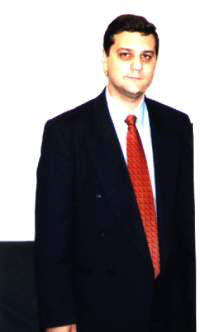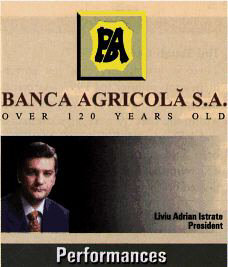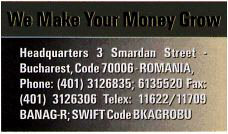
|
| |

|
 Romania Romania
the awakening giant of Europe |


Read our exclusive interview.
|
 BANCA AGRICOLA BANCA AGRICOLA
Manager:
Mr. Istrate,
Chairman of Banca Agricola
Contact:
3, Smardan Street,
Bucharest 3,
Romania
| Phone : |
401 6144260 |
| Fax : |
401 3159603 |
|

One of the largest romanian commercial banks in terms of assets (ROL 10,011.7 billion)
The largest deposit from individuals (ROL 4,112 billion)
One of the largest number of account holders (1,533,223)
The largest network(306 branches)
Over 200 correspondent banks abroad
Two share issues (1992-1993 and 1995)
Relative high percentage of privatization (43%)
It manages 195 million US$ loans from IBRD and EBRD
The bank is nominated for the General Sales Manager (GSM 102) Program - of USA Agricultural Demartment, the Bank being guaranteed by the Ministry of Finance

Short, medium and long terms loans to individuals and to all kinds of commercial companies from all economic sectors
Payment in ROL and foreign currency
Setting up individuals and corporated deposits in ROL and in foreign currency
Special consulting and network assessments
Safekeeping of jewelery and other valuables
Issue of banking guarantee letters
Selling of insurance products
Leasing
Derivatives
Discounting and forefeiting
Avalizing
Distribution of shares on the primary market for different issuers
Custody bank services for institutional investors
Special settlements for security transactions
Mutual funds deposits
Access to SWIFT
Foreign exchange operations including VISA, EUROCARD/MASTERCARD and traveller's cheques
Issue of Cards both in ROL and in foreign currency.

 Company
Profile Company
Profile
 Activities Activities
Financial institution.
 Strategy Strategy
 Interview with Interview with
Mr. Istrate,
Chairman of Banca Agricola
Question: Mr. Istrate, there is no doubt that your bank is a leader in your sector, but could you give to our readers a brief historical background of your bank, as well as your professional experience?
Answer: Banca Agricola is one of the largest commercial banks in Romania and also one of the oldest because it has been set up more than 120 years ago. We can say that we have a big historic on banking activities. Banca Agricola was formed as an agriculture bank for supporting and financing the Romanian agriculture. In all this period of time, agriculture was one of the most important sectors in our economy. Before the 2ndWorld War, Romania was one of the biggest exporters of cereals and one of the most important trade countries. At that time, the Romanian currency, Lei, was stronger than the German Mark. Of course, after the war, everything has changed and Banca Agricola became a state owned institution for implementing the socialist policies in different directions especially in agriculture business. One of these policies was to support agriculture in order to keep a very low food price. I can tell you that, economically, it was a very bad policy, because it destroyed the initiative, the competitive environment and the potential of all the competitors as well. One year ago, when the new government took office, they understood that all the political influences created big problems for agriculture, industry and for us, too. I’m talking about the fact that during the six years since the revolution, the former regime continued to keep the price of food on very low levels through subsidized loans. This means that all the costs have been paid by Banca Agricola and at the end of that period we have accumulated very big losses and et the same time a lot of inefficient loans. The new government decided one year ago to restructure our bank by a recapitalization of the balance sheet, and by issuing about half billion $ T-bills.
Q: What are the main aspects of this restructuring plan?
A: First of all, our balance sheet losses were cut down and taken off-balance sheet, the state financed them through the T-bills and then we started to do our business on a real base, giving loans and services only to good customers, to those who are able to act in a market economy. From a political and strategic point of view we have focused on a market oriented business, we have plans to give the customers all the banking products and services. Our main goal is to become a retail bank, to be more competitive on the international market and to continue to act as an important bank in Romania.
Q: What where the financial results of last year?
A: Last year we had a gross profit of 161 billion Lei. After the restructuring exercise started in September our forecasts were to have losses last year, but we managed to obtain profit. This year we continue the restructuring program and at the end of this process we will be privatized, at the end of 1999.
Q: So, you won’t be privatized this year?
A: No, some people are talking about this, but I don’t think so. Of course, it’s not our task to speak about privatization, we just have to make money and restructure the bank and the owner will decide when we are to be sold and who the buyers will be. There is a privatizing committee especially created for Banca Agricola and in this respect you can contact them.
Q: How is Banca Agricola affected by the new system of agricultural subsidies in place for 1997 and 1998?
A: Banca Agricola is not subsiding the agricultural industry any more, there are no longer political influences regarding the policy of our bank, so we are allowed to make profit in every sector we wish. The World Bank and the IBRD are watching our results and keeping us safe from the eventual political influences. In this respect, as I told you, Banca Agricola will be just a real commercial bank. We’ll deal in agrobusiness just with the profitable customers, no matter if they are state owned or private. Maybe we should change the name of the bank because we are no longer an agricultural bank.
|
Q: Are you thinking of that?
A: Yes, we thought already and we have a very good suggestion for a name. As soon as possible we will do it, but we also must ask the owner, the State Ownership Fund. This isn’t an easy thing to do because there are still a lot of old mentalities, not in the bank but in the country, there are a lot of pressures for the bank to remain the support of agriculture, even if we continue to lose.
Besides, I would like to make a small comment. As I told you, the subsidized credits have caused big problems to our bank because they have been given to all the agricultural producers, and not only to those who were able to act in a competitive environment. Apart from that, due to the inflation and to other aspects of the financial crisis in our economy, the biggest part of these subsidized loans became inefficient, which means that the clients were not able to pay back their debts which created a large loss portfolio for our bank. This is why the state have decided to restructure the bank and cover the losses and also for that we have decided to change our policy for the future. First, our lending activity to agriculture will decrease, since they proved to be too risky (the default risk would be one of the most important) but, on the other hand, we will focus more on those industries which started to increase their capacities to export, like the food or the furniture industry. We will grow together with our clients and this is one of our important tasks and dreams.
.
Q: What is your opinion on the Romanian banking system? Which are its strengths and its weaknesses?
A: My personal opinion is that we have a growing banking system, a lot of foreign banks are opening branches is Romania. I think the system will develop and I think that the market it’s big enough for all of us. We don’t have yet enough banks and the increase of the number of banks will be good for the Romanian banking system because it will create competition and the quality of the services provided to the customers will improve. On the other hand I should add that we have a good skill because, as I told you, we are one of the important banks in Romania, with a long background and we have a professional staff. We promoted the idea of the proper people in the proper places. So, to become a stronger bank, we have to promote our most valuable people.
Q: Regarding this competition, what specific advantages does your bank possess against the competitors?
A: The advantage is that we have 40 % of the Romanian people savings and this is an important resource. I must add that we have the biggest network in the country, we have 306 units which is a good base for retail activities. Two months ago we had a lay off of 1500 employees, we had another 800 and we will have another one of
1000 people, so, from a total of 11500 employees, only 8500 will be left. We have closed almost 60 inefficient units and we have prepared new ones to open in optimized locations or emerging markets. This is why acting for rising the quality of our staff we have focused on improving our services and our products. With this new structure we can continue our activity, make it very flexible and satisfy the customer’s needs
Q: Do you have courses or any other training?
A: Yes, we do have courses for different specialities, including English training courses. In this respect I can point out that one of the first steps of the restructuring exercise was to establish a special training division who has the task to train the staff and to improve the quality of their work.
We also brought some foreign advisors and one of them is from the American Express Treasury. We are going to take another few specialists from the Bank of Ireland through the World Bank and we want to take advantage of these advisors, of their experience. They will help us with procedures and mentality, they are not just visitors here. They will be part of our staff. We are very opened and transparent to ask for help and to collaborate with foreign specialists. Our bank is the only state bank which has asked for people with vocational training and I can say that this is another secret of ours. During our Board of Directors session the top managers are invited to be in touch with our way of thinking. We don’t have to spend hours just to transmit something because they already have the general ideas. We also have another big advantage: we are very flexible, we act as a real commercial bank. Due to our managers, the Board of Directors is very fast in taking the proper decisions to meet the needs of the clients and this is the key to success. Some people used to say that this is difficult to do in a state owned bank, but it’s not hard, it’s a matter of management.
Q: As you have said you are opened to everyone. Our readers are interested in new business opportunities. In which areas of your activity are you interested to attract partners or investors?
A: They can approach us for the capital market, treasury products, money exchange, both on the domestic and international markets. We have almost 200 correspondent banks, and we are also very active on the cards business ( VISA, EUROCARD, MASTERCARD) not to mention the foreign credit lines. We have 2 big credit lines from IBRD and EBRD, which means that the World Bank and the European Bank are our partners in doing good business so they consider us a competitive bank not only for the Romanian environment but also for the international one.We will have a very performant IT system which is meant to link all our units by satellite on line with the headoffice.
We are developing our relationships with the big names on the international markets, because, until now, this bank hasn’t acted on them, except for the domestic ones and, even here, we were specialized only in agricultural credits. In my former job as a treasurer, I used to adapt my methods to my client, to provide him with high quality services. Now having the responsibility to restructure this bank I have to bear in mind the customers’ needs. We are protecting our clients and the message to all our employees is clear: you have to serve the client, so ask him about his needs. Of course, I have to stimulate my staff towards this objective. Maybe the Romanian banking system will be shocked when they find out that some people in Banca Agricola will be paid better than in CitiBank. I promised it and I keep my promises. The people who are not willing to push hard will have to leave us.
Q: Regarding the foreign partners, as we say in the United States, contacts means contracts. What will you do to encourage contacts?
A: First of all, we have a plan of visiting all the foreign banks in the big financial centers banks so that the name of our bank should be carried away in order to attract their clients to Romania. Famous companies have already showed their interest in investing in Romanian business. We hope that Banca Agricol„ will benefit from this opportunity too.
Q: As a more personal issue, what has been your most satisfying personal achievement since you are being president of Banca Agricola or what could be it?
A: I have already the satisfaction that we have managed to obtain profit at the end of 1997, when everybody was expecting to have losses. We have signs that this year we’ll continue to obtain profit if we are very prudent. We need to make small steps because we are just recovering after a bad period of time and we have to focus just on making money. We have two important institutions behind us, the World Bank and IBRD and we have the strong support of the Ministry of Finances, of the State Ownership Fund and of the Central Bank.
Q: As a final issue, what will be your final message to our readers?
A: To approach Banca Agricola, to meet us and we can promise that we will try to serve them as good as possible and offer them high quality services.
|
© World INvestment NEws, 1998.
This is the electronic edition of the special country report on Romania
published in FORBES
Magazine's enriched with complementary information,
such as full interviews, detailed company files and more.
June 1 st 1998 issue
Developed by AgenciaE.Tv |
|
|
|
|
|
|
|
|
|
|
|

